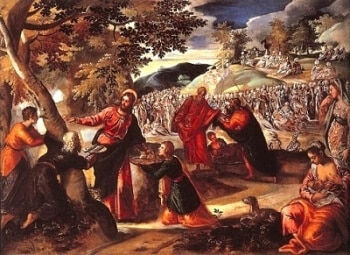
Young people look forward to graduation today so they can move out of the restrictive environment of school and be “free at last.” Soon, however, they realize they are not as free as they thought they would be. To move forward in life, they must become a part of new systems that involve getting up early and going to work every day, paying taxes, and taking on unpleasant responsibilities in life. Then people begin to look forward to “empty nest” time or retirement time when they can be “free at last.” And yet these times bring their own sets of challenges and restrictions, like scheduling life around doctor appointments. Does a “free at last” time ever happen?
Jesus preached that the “free at last” time can be now. We don’t have to wait for graduation day. The problem is, his disciples didn’t catch on, and most of the time we don’t either. Let’s listen in on a conversation between Jesus and his disciples during one of their boat rides (Mark 8:14-21).
“The disciples had forgotten to bring bread, and they had only one loaf with them in the boat. Jesus enjoined them, ‘Watch out, guard against the leaven of the Pharisees and the leaven of Herod.’ They concluded that it was because they had no bread.”
Jesus was talking about spiritual food, and they were thinking about what to have for lunch. Leaven is a small substance that gets inside a piece of dough and inflates it. On a different level, leaven is a subtle influence that gets inside the dough of a person and begins to fill their lives. The Pharisees presented the leaven of religious observance as the key to a happy life. Herod presented a system of government as the key to a happy life. These kinds of leavens might bring temporary “inflation” to life, but then they aren’t lasting, and the bread becomes flat again. Such leavens do not really work. Jesus was presenting a new kind of leaven, the indwelling of the Holy Spirit, that was fulfilling and lasting. Sadly, most people of the day were content with cheap substitutes like the leaven of the Pharisees or the leaven of Herod.
“When Jesus became aware of this, he said to them, ‘Why do you conclude that it is because you have no bread? Do you not yet understand or comprehend…do you have eyes and not see, ears and not hear?’”
They were slow learners. Even after the miracles they had just experienced, they thought Jesus was talking about lunch rather than spiritual bread.
So, he gave them a quick review lesson:
“…do you not remember, when I broke the five loaves for the five thousand, how many wicker baskets full of fragments you picked up?” They answered him, “Twelve.” When I broke the seven loaves for the four thousand, how many full baskets of fragments did you pick up?” They answered him, “Seven.” He said to them, “Do you still not understand?”
What amazes me is that these “slow learners” remembered the numbers of baskets of food. Jesus must have had them count the baskets to impress on them what had happened. Seven marked God’s day of rest after the six days of creation. Twelve was the completion number as when their father Jacob finished his work after his twelfth son was born. The disciples were right in the middle of the “end times.” Jesus was bringing them the Kingdom of God—a day of rest, a day of completion. All of history was culminating at this moment. God was now completing his work by infusing the leaven of his Kingdom into the world.
What about us? Do we still not understand?
God has poured out the leaven of the Holy Spirit into us. We are “free at last” in our quest for the meaning of life and the recipe for happiness. And yet we, like the disciples, keep going backwards to a “what’s for lunch” mentality. Will we let the day of completion come into our hearts and enjoy true freedom?
Come Holy Spirit. Take root in our hearts!
